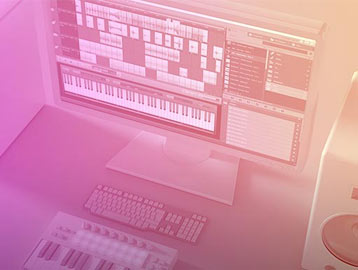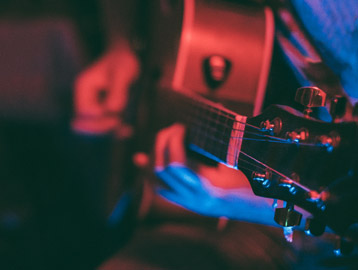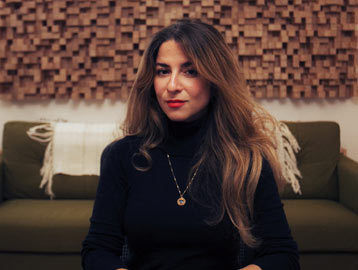NEW
Artist Interview: Garry King

“Do you want to be a wave maker or a wave rider?” – not only have these words helped make Garry King who he is today, but they are also a recipe for success in the creative industries.
King, originally from England, has worked with guitar legend Jeff Beck and the former leader singer of Deep Purple, Joe Lynn Turner, among other notable artists. Over the years, he has come to specialize in recording drums, which he does in his own studio using Samplitude Pro X2.
Profile: Garry King
England, 1965 – 2000:
- Born in England, Garry begins making music at the early age of nine.
U.S.A., 2000 – 2005:
- Garry launches the “Making it Count” project in New Mexico, which uses music to teach kids important values, such as being dependable, having a good work ethic, dedication, passion and being able to estimate workloads.<
France, 2005 – today:
- Studio work and sessions for other artists
- Founding of his own production company, La Foret Groupe.
- Tour with Joe Lynn Turner in South America.
- Work as a drummer for Achillea and Darkyra Black, a female gothic metal singer.
- Collaboration with Mike LePond, bassist for the American progressive metal band Symphony X.
https://soundcloud.com/magixofficial/sets/garry-king-audiosamples
Studio & Musicproduction – „It is so important to create your own music and share your vision with others.“
How did you come to produce music in your own studio?
I started working on other peoples’ music as a producer thanks to my friend, Grammy nominated producer and writer, Rick Hale in the US. After many years of recording drums and bouncing ideas around for projects, he suggested that I should really set myself up not only to record, but to advise and produce sessions and records using my background, history and knowledge.
Thanks to the Internet, advice and research, I learned very fast, and I think I have always had a good pair of ears. It became a passion to see what was being sent to me and how I could contribute to other peoples’ magical ideas.
What was most important for you when building your own studio?
I wanted to have a place that felt comfortable and cool, a place that drew me in and told me I should be here. We live in a very large restored barn in the country, so noise and neighbors are not a problem. I have a fairly large control room and a very large drum room that can be configured from a more live sound to a tighter sound, depending on what people want. I built the rooms myself with some help from professional friends in the business, and treatments etc. are simple, but very effective.
As far as what I use, again, it’s very simple. I’m PC based, using hybrid drives now with Windows 7 and Samplitude Pro X2 Suite. I have a KRK monitoring system, a Phonic 16 input Analog to Digital interface/board with a couple of Grace Design M101s for kick and snare mainly (nothing fancy, but it does have its own signature sound, I’m told), and various other interfaces like Presonus and a Makie control surface. I do everything in the box and use, as my main go to VSTs, Waves SSL, CLA, The Oxford Suite, some Steven Slate, Jack Joseph Puig Drums, Drumagog 5 as well as, of course, MAGIX’ own VSTs like efx Reverb and delays and the Vandal Amp. I try to stick to a few and use them well, as opposed to having many and not knowing what the hell they do. I use CAD and AKG microphones, and control the studio computer remotely using a mini laptop and VNC viewer.

Do you think every musician should learn to produce music themselves?
Yes for sure. It’s so important to work on your own stuff and share your ideas, then at the very least be able to relay and show another producer/musician your vision and how you see the end results, even if you only create demos to start with.
Does your work as a studio musician and producer influence the way that you make music today?
Yes, I always used to look at things from a band perspective and still do to a point. But now I really look at the song and if it has radio/play possibilities. Could this be on radio and sell commercially?
“Could this be on radio and sell commercially?”
That is one of the most important things. It‘s great to think of your artistic input on a track, but if that track is not appealing to a large audience and something that they will remember, then it won’t go the distance.
Samplitude pro X2 – “Samplitude is like a box of non-stop surprises”
Which Samplitude tools are your favorites?
After using a number of DAWs in PC format, I was turned on to Samplitude a few years back by George Boussounis. I started using, just as a test, Music Maker 2013 for a short while, then went straight to Samplitude Pro X Suite and have never looked back. When I first started editing drums on a basic session, it took around 3 to 4 hours. But now, using Samplitude, it takes around 45 minutes, depending on the track. So this is amazing. After that, the ease of operation with no lag in the computer made every slice and move faultless. I’ve really only touched the tip of the iceberg of what the program can do, but I just love everything about it. It’s so simple, yet it has everything you can dream of and looks great on screen. The restoration side of Samplitude is just crazy, so easy to clean up clicks and pops, hums and noise. Again, a very fast economic way for doing things – I could go on forever…
If you could wish for any function in the next version, what would it be?
I really don’t think I have something off the top of my head. Samplitude is like a box of non-stop surprises.
”Slight variation is what real music is about.“
Do you have any special tricks for recording percussion?
I normally run 16 mic inputs on my basic recordings, including room mics and overheads. But that can change down to less, of course. I use a lot of smaller sized drums, toms etc., which I think are very musical. But first mic placement is the key.
I have a medium gain set on the pre-amps so they are not too hot, but enough to make them work for me a little. I don’t normalize any tracks until the sessions are approved or finished, in case I have to go back and fix anything maybe a few days later. All my drums are grouped to separate sub mix buses, for example toms, kicks, snares, metal. Then they can be sent to two main AUX buses I call Drum Ex Comp for added aggression and Drum Room for extra ambience. The usual kind of thing.
I always try to play a song from start to finish, so I spend a lot of time learning the tracks to make a performance. You won’t find the chorus the same each time around. I think slight variation is what real music is about. These days there is too much cut and paste, so I’m a little more old school with this.

What can Samplitude users learn from you? Do you use methods like sinus trigger or drum replacement? How do you influence the sound?
I think that anyone who looks into recording, products, and perhaps already uses Samplitude, has a simple way to develop their skills from an amazing DAW. It’s so easy to use, but saying that, you still have to work at it to get what you want. The audio engine is killer and you can hear the difference, you really can. As I have mentioned to many people, editing my drums for any sessions has turned a laborious, lonely job into a joy. It’s just perfect for this, even before you get onto what the mixing and mastering potential is.
Yes, I use drum replacement, but mainly kick, snare and floor tom. Well, I don’t replace, I blend with my own real samples and sometime stock drum samples, depending if we want something a little radical or to create an edge. Especially the floor tom, as it picks up a lot of cymbal overspill along the way. I’m set up here, so it’s a great way to remove some of that by bringing the sample level up as a blend. I really work hard to get the overall sound as real as it can be. As a mixer and touring drummer, I think what we create always sounds very live – that real band feel.
“It`s a shame that a lot of people miss out on original songs and music these days”
Where do you find inspiration for your music?
I find it everywhere. I listen to everything, even if I’m not a big fan, just to see what kind of vibes I can get. Anything from metal, to pop, country to RnB and rap. There are so many things you can miss on one listen through, so giving any music style a chance is worthwhile. There are times I have sat down listening to music we work on, almost in tears, thinking: “Wow we created that!” That’s how inspiring music can make you feel. It’s just a shame that a lot of people miss that and miss out on original songs and music these days. We all just wanted to play and work on music, not be superstars or anything like that.
Compared with other media, music is the main source of inspiration for people. Which drummer inspires you the most?
That’s a real tough one, so I can give you my favorite 5:
- Rock/Fusion: Rod Morgenstein (Winger, Dixie Dregs, Jazz is Dead)
- Old school: Ginger Baker (Cream)
- Groove/Pop: Jon Fariss (INXS)
- Power House Stadium: Mel Gaynor (Simple Minds)
- Studio Session Master: Geoff Dugmore (The Europeans; Independent — you name it, he’s on it!)
I love so many players from so many genres, like Aaron Spears or Mark Schulman. But the ones above do it for me overall. I’m a massive guitar fan, so I actually get more inspiration from guitar players and work very closely with the grooves of guitars before anything else.
“Remember that this is a business, not a game”
What tips would you give to young musicians that would have helped you as a young man?
Oh where to start! First, always to listen, especially to people who are ahead of the game, soak up as much info as you can and whatever you do, try to be original. Take what you love, but make it your own. Create, don’t copy.
Most important of all, remember that this is our business and not a game. If you want to work, you have to go for it. A good friend of mine coined the pun “Do you want to be a wave maker or a wave rider?”. I think you know what I mean. Make it happen yourself and don’t wait for someone to do it for you and then jump on board.
Is there something that you wish that you had known earlier?
Yes, I wish I had known how much hard work goes into self promotion. Back in the day, we had nothing like what we have now to promote ourselves and I think I slipped up many times, trying to get myself out there. Now the world is watching. Without self-promotion, and I’m not talking about fake likes or plays on various social media sites, but finding a way to get your product to the right people, you really have nothing. Our industry has always been a hard one, now so much more than ever. But the net has also given us the option to talk, promote and meet creative people easily, which is amazing.
You’ve already worked with guitar legends like Jeff Beck and Deep Purple singer Joe Lynn Turner. Were those the personal highlights in your music career?
I have had some great chances to work with some great people, some old and some new. However, for me working with Jeff Beck in the studio was an amazing experience never forgotten. It was a long way back, when I was still in the UK, but it was the best. I’m a total guitar nut, so you can imagine how cool that was for me. Jeff was also a total cool and nice guy, and you only get what he is about when you are in the same room with him. He is so easy going and makes you feel as important as he is. Don’t get me wrong, he was not banging on my door for me. I had to get myself in there, which took a while, but it happened. It’s been like that with pretty much everything I have done to date. I have to make things happen, like working with Joe Lynn Turner. I contacted him, pitched him some ideas, which he liked, and then, with another friend, we created two South American tours in 2009/2010. But we had to do all the groundwork and, again, make it happen. That gives you a real feeling of achievement.
Trying our best is such an important part of all this. Never give up and look for ways to get yourself, your sound and your image out there to inspire other people with your talent.
Further Links:
- Youtube: https://www.youtube.com/user/garrygarnoe
- Official Website: http://www.garrykingmic.com/
- Twitter: https://twitter.com/garry_king2011
- Instagram: https://instagram.com/garry_king_music/
Next Post >
Artist Interview: Siegfried Meier
< Previous Post
Developer Interview: Robin Lobel
Related Posts
The new sound of Music Maker hits the 2 million installs mark!
The new Music Maker gets a new audio engine. All information about the new engine and other intuitive functions you can find here.
The new Samplitude Music Studio
Samplitude Music Studio – the entry level DAW that gives musicians everything they need. We'll show you all news.
Artist Interview: Heba Kadry
Heba Kadry shares her experience as mastering engineer in the New Yorker Timeless Mastering Studio
Artist Interview – Trap producer Simtem
The Canadian producer Simtem about Trap talked with us about the music business and the Music Maker.



